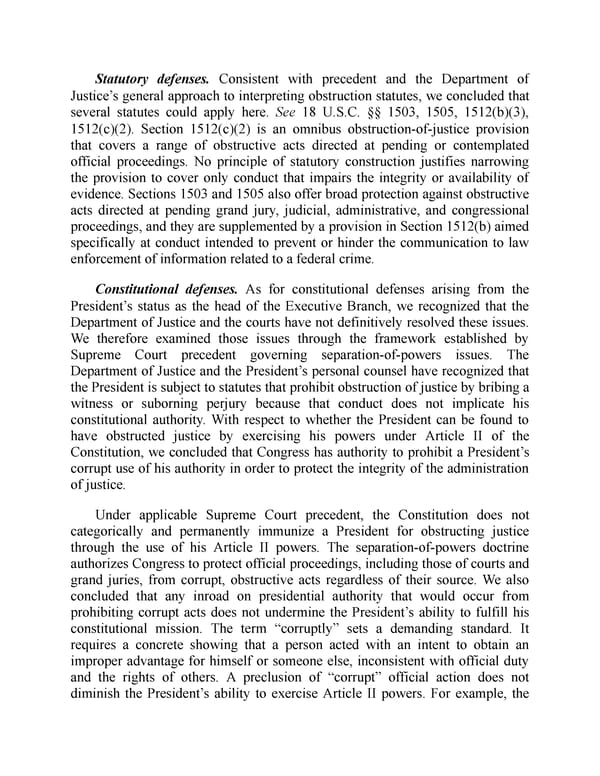Statutory defenses. Consistent with precedent and the Department of Justice’s general approach to interpreting obstruction statutes, we concluded that several statutes could apply here. See 18 U.S.C. §§ 1503, 1505, 1512(b)(3), 1512(c)(2). Section 1512(c)(2) is an omnibus obstruction-of-justice provision that covers a range of obstructive acts directed at pending or contemplated official proceedings. No principle of statutory construction justifies narrowing the provision to cover only conduct that impairs the integrity or availability of evidence. Sections 1503 and 1505 also offer broad protection against obstructive acts directed at pending grand jury, judicial, administrative, and congressional proceedings, and they are supplemented by a provision in Section 1512(b) aimed specifically at conduct intended to prevent or hinder the communication to law enforcement of information related to a federal crime. Constitutional defenses. As for constitutional defenses arising from the President’s status as the head of the Executive Branch, we recognized that the Department of Justice and the courts have not definitively resolved these issues. We therefore examined those issues through the framework established by Supreme Court precedent governing separation-of-powers issues. The Department of Justice and the President’s personal counsel have recognized that the President is subject to statutes that prohibit obstruction of justice by bribing a witness or suborning perjury because that conduct does not implicate his constitutional authority. With respect to whether the President can be found to have obstructed justice by exercising his powers under Article II of the Constitution, we concluded that Congress has authority to prohibit a President’s corrupt use of his authority in order to protect the integrity of the administration of justice. Under applicable Supreme Court precedent, the Constitution does not categorically and permanently immunize a President for obstructing justice through the use of his Article II powers. The separation-of-powers doctrine authorizes Congress to protect official proceedings, including those of courts and grand juries, from corrupt, obstructive acts regardless of their source. We also concluded that any inroad on presidential authority that would occur from prohibiting corrupt acts does not undermine the President’s ability to fulfill his constitutional mission. The term “corruptly” sets a demanding standard. It requires a concrete showing that a person acted with an intent to obtain an improper advantage for himself or someone else, inconsistent with official duty and the rights of others. A preclusion of “corrupt” official action does not diminish the President’s ability to exercise Article II powers. For example, the
 Mueller Report PDF Page 282 Page 284
Mueller Report PDF Page 282 Page 284